Related Research Articles
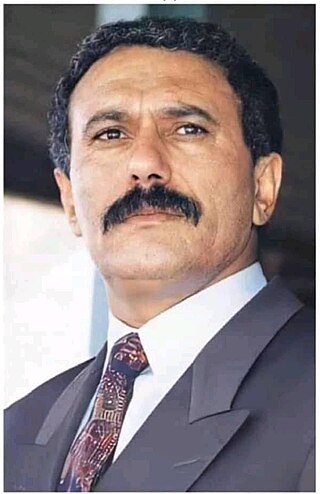
Ali Abdullah Saleh al-Ahmar was a Yemeni politician who served as the first President of the Republic of Yemen, from Yemeni unification on 22 May 1990, to his resignation on 27 February 2012, following the Yemeni revolution. Previously, he had served as the fourth and last President of the Yemen Arab Republic, from July 1978 to 22 May 1990, after the assassination of President Ahmad al-Ghashmi. al-Ghashmi had earlier appointed Saleh as military governor in Taiz.
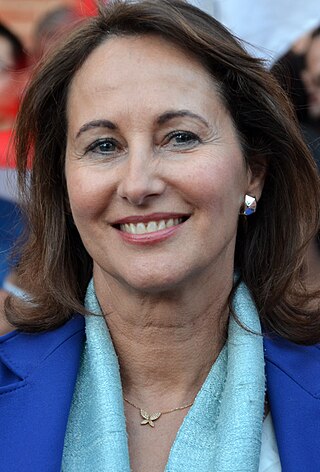
Ségolène Royal is a French politician who was the Socialist Party candidate for the Presidency of France in the 2007 election.
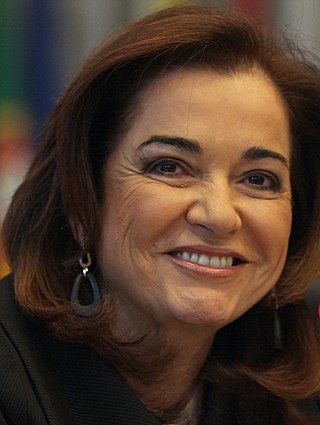
Theodora "Dora" Bakoyanni is a Greek politician. From 2006 to 2009 she was Minister of Foreign Affairs of Greece, the highest position ever to have been held by a woman in the Cabinet of Greece at the time; she was also Chairperson-in-Office of the Organization for Security and Co-operation in Europe in 2009. Previously she was the Mayor of Athens from 2003 to 2006, the first female mayor in the city's history, and the first woman to serve as mayor of a city hosting the Olympic Games. She also served as Minister for Culture of Greece from 1992 to 1993.
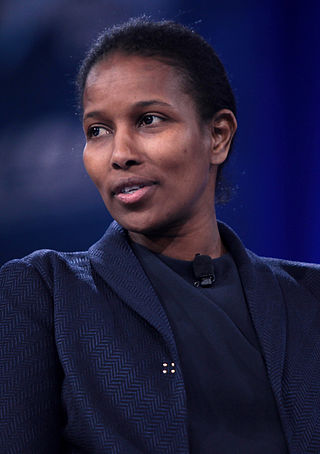
Ayaan Hirsi Ali, Lady Ferguson is a Somali-born Dutch-American writer, activist and former politician. She is a critic of Islam and advocate for the rights and self-determination of Muslim women, opposing forced marriage, honour killing, child marriage, and female genital mutilation. At the age of five, following local traditions in Somalia, Ali underwent female genital mutilation organized by her grandmother. Her father—a scholar, intellectual, and a devout Muslim—was against the procedure but could not stop it from happening because he was imprisoned by the Communist government of Somalia at the time. Her family moved across various countries in Africa and the Middle East, and at 23, she received political asylum in the Netherlands, gaining Dutch citizenship five years later. In her early 30s, Hirsi Ali renounced the Islamic faith of her childhood, began identifying as an atheist, and became involved in Dutch centre-right politics, joining the People's Party for Freedom and Democracy (VVD).
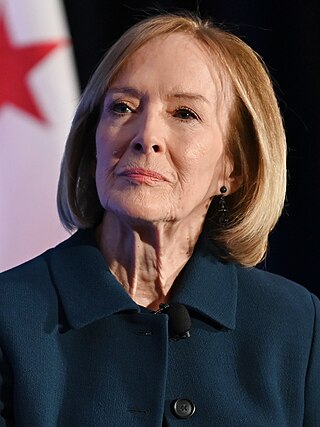
Judy Carline Woodruff is an American broadcast journalist who has worked in local, network, cable, and public television news since 1970. She was the anchor and managing editor of the PBS NewsHour through the end of 2022. Woodruff has covered every presidential election and convention since 1976. She has interviewed several heads of state and moderated U.S. presidential debates.

Nayla Moawad is a Lebanese politician and former First Lady of Lebanon. Outside of Lebanon, she is best known as the widow of former President René Moawad, who was assassinated on 22 November 1989. Within Lebanon, she is a high-profile politician in her own right, having served as a member of the National Assembly since 1991. Following her reelection in June 2005, she was appointed to the Cabinet on 19 July as Minister for Social Affairs.

Fatima Jinnah was a Pakistani politician, stateswoman, author, and activist. She was the younger sister of Muhammad Ali Jinnah, the founder and first Governor-General of Pakistan. She served as the Leader of the Opposition of Pakistan from 1960 until her death in 1967.

Human rights in Yemen are seen as problematic. The security forces have been responsible for torture, inhumane treatment and even extrajudicial executions. In recent years there has been some improvement, with the government signing several international human rights treaties, and even appointing a woman, Dr. Wahiba Fara’a, to the role of Minister of the State of Human Rights.
Zana Muhsen, is a British author known for her book Sold: Story of Modern-day Slavery and its follow-up A Promise to Nadia. The books narrate the experiences that she and her sister Nadia went through after they were sold into marriage by their father, Muthanna Muhsen, a Yemeni émigré.
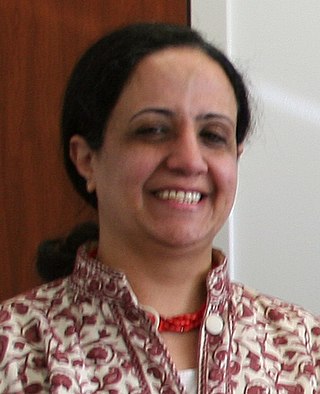
Amat Al Alim Alsoswa is a Yemeni journalist, and Yemen's first female ambassador and minister.
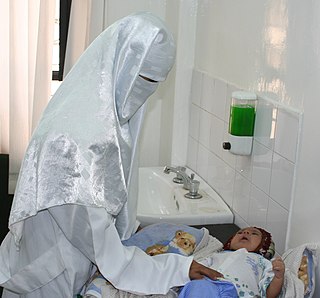
Women in Yemen suffer from gender-based discrimination due to the highly patriarchal character of Yemeni society. Although the government of Yemen has made efforts to improve the rights of women, many cultural and religious norms stand in the way of equal rights for women. Poor enforcement of the legislation by the Yemeni government exacerbates the problem.

The Yemeni revolution followed the initial stages of the Tunisian Revolution and occurred simultaneously with the 2011 Egyptian revolution and other Arab Spring protests in the Middle East and North Africa. In its early phase, protests in Yemen were initially against unemployment, economic conditions and corruption, as well as against the government's proposals to modify Yemen's constitution. The protesters' demands then escalated to calls for the resignation of Yemeni President Ali Abdullah Saleh. Mass defections from the military, as well as from Saleh's government, effectively rendered much of the country outside of the government's control, and protesters vowed to defy its authority.

Tawakkol Abdel-Salam Khalid Karman is a Yemeni journalist, politician, human rights activist, and revolutionary. She leads the group "Women Journalists Without Chains," which she co-founded in 2005. She became the international public face of the 2011 Yemeni uprising that was part of the Arab Spring uprisings. In 2011, she was reportedly called the "Iron Woman" and "Mother of the Revolution" by some Yemenis. She is a co-recipient of the 2011 Nobel Peace Prize, becoming the first Yemeni, the first Arab woman, and the second Muslim woman to win a Nobel Prize.

The Yemeni Congregation for Reform, frequently called al-Islah, is a Yemeni Sunni Islamist movement established in 1990 by Abdullah ibn Husayn al-Ahmar, Ali Mohsen al-Ahmar, Abdul Majeed al-Zindani, with Ali Saleh's blessing. The first article of Islah basic law defines it as "a popular political organization that seeks reform of all aspects of life on the basis of Islamic principles and teachings".

Women played a variety of roles in the Arab Spring, but its impact on women and their rights is unclear. The Arab Spring was a series of demonstrations, protests, and civil wars against authoritarian regimes that started in Tunisia and spread to much of the Arab world. The leaders of Tunisia, Egypt, Libya, and Yemen were overthrown; Bahrain has experienced sustained civil disorder, and the protests in Syria have become a civil war. Other Arab countries experienced protests as well.
Nada Al-Ahdal is a human rights activist and resident of Yemen known for escaping two different child marriage pacts her parents had made for her. In 2013, al-Ahdal posted a YouTube video decrying child marriage and her being forced into marriage contracts, which quickly went viral and prompted coverage of Yemen's continued practice of child marriage.
Rashida al-Qaili is a Yemeni journalist who ran for President in 2006 with an anti-corruption focus. She also intended to increase freedom. She was the second woman to stand after Sumaya Ali Raja. al-Qaili was a columnist whose satirical comments that appeared in the Al-Wasat newspaper and the Al-Shura newspaper until it was "suspended".

Nadia Abdulaziz Al-Sakkaf is a former Yemeni Minister and politician. She was the editor in chief of the Yemen Times from 2005 until 2014, before becoming Yemen's first female Minister of Information. She fled Yemen in 2015 after the coup and is currently an independent researcher in politics, media, development and gender studies based in the United Kingdom. In 2011, Al-Sakkaf gave a popular TED talk called "See Yemen through my eyes" which had over 3 million views.

Yasmin Al Qadhi is a Yemeni journalist who rescues child soldiers. She was chosen as an International Woman of Courage in March 2020.
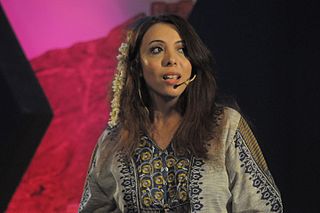
Hind Al-Eryani is a Yemeni activist and journalist. She advocates for women's rights, LGBTQ+ including gender minorities, and peace in Yemen, and has written many articles in support of the topics. She has also fought against khat, a drug-like substance.
References
- 1 2 3 Betsy Hiel, Woman wants to lead Yemen, Pittsburgh Tribune, March 12, 2006.
- ↑ YEMEN: Second woman declares intention to make bid for presidency, IRIN , 15 March 2006, Retrieved 14 April 2016
- ↑ Nasser Arrabyee, 'Good omen' for Yemeni women, January 13, 2007.